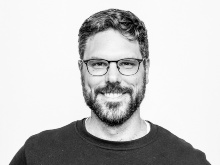Michael Sedlmair, Participating Researcher at the IntCDC and head of a research group at the Visualization Research Center of the University of Stuttgart (VISUS) and at the Department “Augmented Reality and Virtual Reality” at the Institute for Visualization and Interactive Systems (VIS) in Faculty 5, was appointed to a permanent W3 professorship. This after only 2.5 years on a tenure-track professorship, funded by the Carl Zeiss Foundation, and after a successful final evaluation, which was brought forward due to a call to another university.
The newly appointed W3 professor addresses research questions in the areas of human-machine and human-data interaction. In this context, he and his research group are developing new methods for the interactive visualisation of data, especially those that rely on algorithmic components such as dimension reduction or clustering. He is also working on the fundamentals of perception and cognition, which make it possible to create novel, ergonomic interfaces between complex data and human users. Transferring these ideas to the fields of augmented reality and virtual reality is one of the new challenges he is tackling in Stuttgart.
Michael Sedlmair is also involved in the two Clusters of Excellence of the University of Stuttgart, EXC SimTech “Data-integrated Simulation Science“ and EXC IntCDC „Integrated Computational Design and Construction for Architecture“, as well as in the Collaborative Research Center Sonderforschungsbereich-Transregio (SFB-TRR 161) “Quantitative Methods for Visual Computing”. In addition, he is one of the Cyber Valley professors. He is also a member of the Stuttgart Center for Simulation Science (SC SimTech), where he has recently took on the function of Gender & Equality officer.
About Michael Sedlmair
Michael Sedlmair studied Media Informatics at the Ludwig Maximilian University in Munich and received his doctoral degree in Computer Science in October 2010 (dissertation: Visual Analysis of In-Car-Communication Networks). Afterwards he worked as a PostDoc at the University of British Columbia, as an Assistant Professor at the University of Vienna and most recently as an Associate Professor for Computer Science at the Jacobs University Bremen.
About the Tenure-Track Programme
The tenure-track professorship strengthens the young researcher's career perspectives by making their career paths more reliable, transparent and easier to plan, as well as by strengthening their academic independence at an early stage and making them more competitive on the international stage. The tenure-track process at the University of Stuttgart generally lasts for a period of six years. At the end of this period, if the tenure evaluation is positive then the candidate is awarded a permanent professorship. An interim evaluation is also held after three years in which the candidate's performance thus far is assessed, so that any necessary guidance can be given and any negative developments can be identified at an early stage. In justified exceptional cases, the tenure process can be initiated at an earlier stage after a positive interim evaluation.
- Related Links


